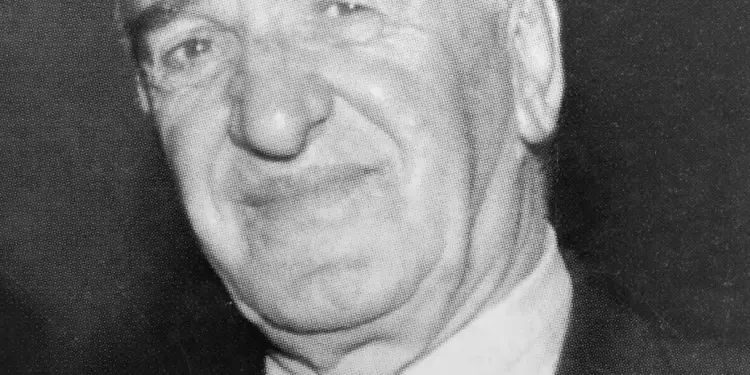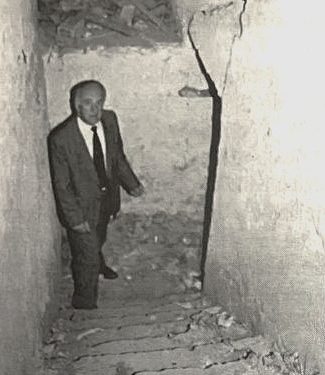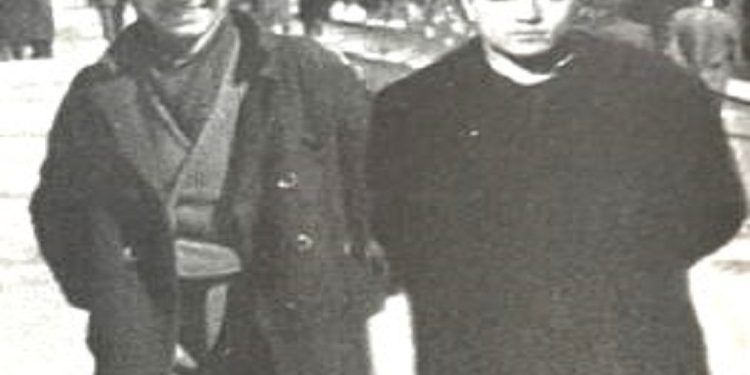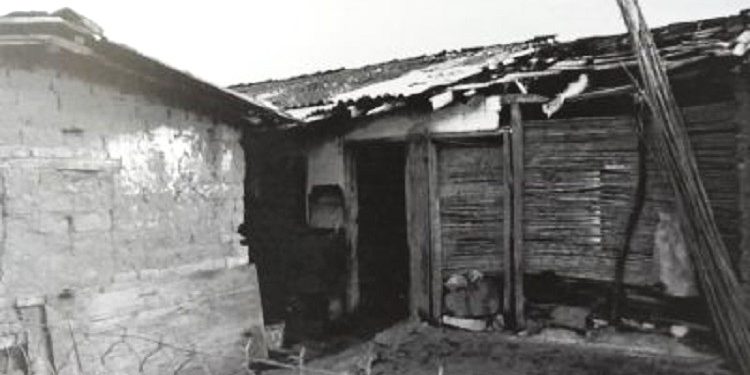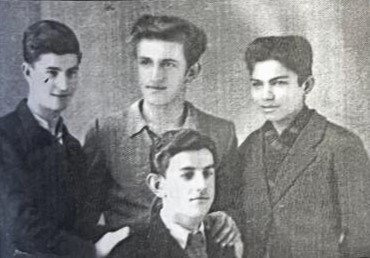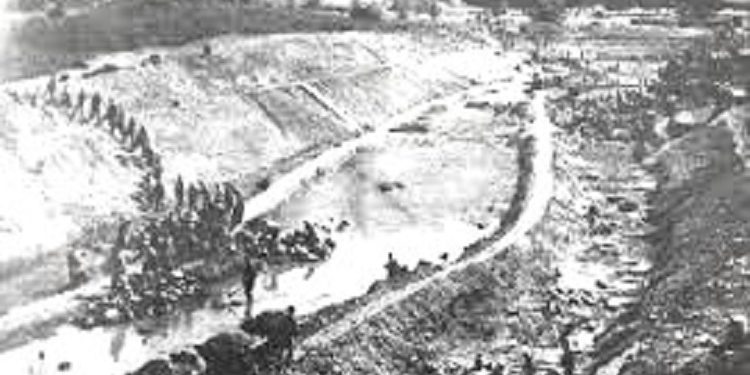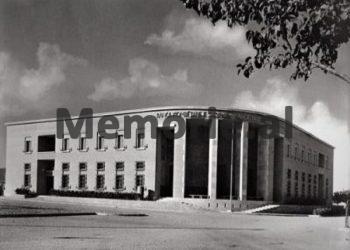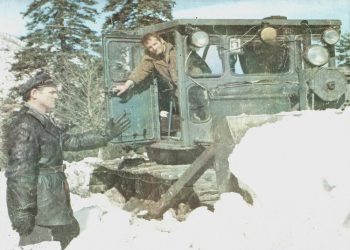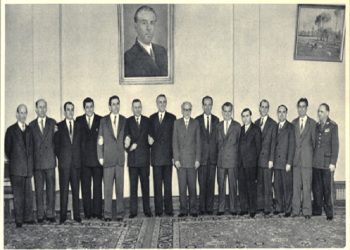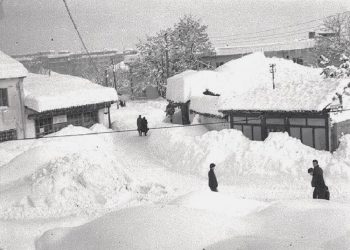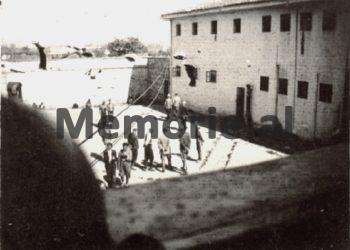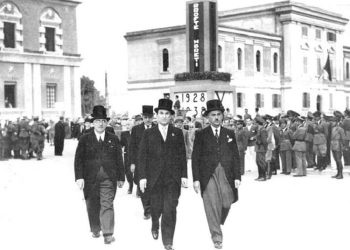By Ahmet Bushati
Part forty-nine
Memorie.al/ After the flag was altered in 1944 with the addition of the communist star, Shkodra transformed into a center of resistance against the regime, paying a high price for its tradition of freedom. By April 1945, high school students, already feeling betrayed by the promises of the war, gathered to oppose the new terror that imprisoned and killed innocent people. Communism turned Kosovo into a province of Yugoslavia, while Shkodra was punished for its “historical crime”- its defiance against invaders. The “Postriba Movement” became a tool to suppress all dissent, plunging the city into an unprecedented spiral of suffering: imprisonments, executions, and the destruction of families. The high school students, alongside citizens, became symbols of resistance, while some “young communists” turned into tools of the State Security, leading to expulsions, imprisonments, and internments.
Four times, Shkodra rose in armed rebellion, but history forgot these battles. This book is written to remember the countless prisoners, the tortured, the killed, and the parents who suffered in silence. It is a warning against dictatorship and a plea for future generations not to forget the sacrifices made for freedom.
Continued from the previous issue
In the Footsteps of a Diary
A high-ranking policeman, as far as he was concerned, even if he was asked on some occasion where he would not go for long, and, already in the second month in that camp, and especially in the third, many of the prisoners, mainly the ordinary ones, exhausted by the terrible work and hunger, were in a completely miserable condition, automatons without strength and will, who also had compromised their human dignity in front of others without regret, while many of the political prisoners, would not give up their self-restrained and dignified attitude even in this case.
On Sundays, if the command did not confuse us with some gathering or baggage check, those prisoners who had nothing to cook outside, exhausted as they were from fatigue and hunger, would spend the entire day of rest lying on their pillows, without moving from their place at all and without wanting anyone to speak to them, and constantly listening to the road, in case they could hear the noise of the car that would bring bread to the camp from Kavaje. This mass of prisoners, crushed to the last, would only begin to come to life when they convinced themselves that from afar, they could hear what sounded like a car, in which case they would turn to the closest person they had there: “Are my ears ringing, or is there really a car noise?”
Or; “Do you think you can hear the car?” – and others like these, would be questions that the prisoners, with gentle and childish glances, would address to each other, as if they had in common the most precious and only thing in the world: bread. If someone happened to enter the silo from outside at that time, one of them would immediately ask him: “Can you hear anything outside”? – That is, without mentioning the word “car”, as it meant to everyone.
It also happened that at that time another prisoner would enter from outside, who, if he had heard the car coming with his ears, even though he saw no one asking, would say in a joyful voice; “it’s coming, its coming”! And with that kind of urgency and tone, as if they were talking about good news, as if it were something that might not happen, although the arrival of bread for the prisoners was the surest thing.
Even if it happened that the bread truck had arrived ahead of time, and even though they knew very well how long it would take to unload, organize and then divide it into rations, as well as the fixed time for the prisoners to gather in line on a day of rest, still, those prisoners who had been lying down until then would start to move around slowly, and with crates in their hands, they would go outside one after the other, bowing and waiting without getting bored for the time when the bread would begin to be distributed.
Thus, in this Bedeni camp, like in no other before and after it, that inner spectrum of man that we have spoken of once again would appear as in a laboratory, starting with those prisoners in whom exhaustion and hunger had extinguished every thought and desire, until they had somehow satisfied the most necessary requirements for existence, to continue with another category smaller in number, especially the ordinary ones, approached as spies from the command, and to reach the worst model of the cruel and sadistic man, such as, for example, the famous Lieutenant Ademi, for his role as representative of the Ministry of Internal Affairs, who was near a prison camp, although small in body and with the only rank of a second lieutenant, would be the man who, with his general behavior, sought to instill fear in everyone and, to enjoy authority to the point of even from his superiors.
I cannot know what powerful instinct must have possessed that this village boy with very little schooling had taught him precisely those kinds of behaviors, fearful and mysterious, that his work required in relation to everyone else, without exception. We had seen him several times; when he happened to be near a group of camp officers, keep to himself. When he happened to come around our work, – which rarely happened, since his work was always at night – he, accompanied by one or more “squadrons” who followed him at a distance, would pass by like a black shadow, without speaking to anyone and without raising his head from the ground, in order to leave the prisoners with the terrifying impression that he was the man who sought to penetrate the most pitiful thoughts of each one.
As the days passed, painful and ugly scenes would follow one another. We had heard of many cases of very hungry prisoners, among others, when one prisoner had eaten the vomit of another. There was very little left to sensitize the prisoners of a camp, in a state of extreme physical condition and with the terrible hunger that had gripped them. Many events, no matter how strange and shocking that occurred within the camp, including deaths, would pass without being transmitted from one prisoner to another, as if they were commonplace, as well as the deep apathy that had taken possession of those prisoners, leading them to the point where they seemed to take everything with fatalistic coolness. There would be times when human nature within that camp would appear in its ugliest aspects, when some prisoners, in the struggle for existence, would have made them submit only to biological laws.
It so happened that on a Sunday morning, I would witness a scene that would have awakened in me not feelings of pity and mercy, but those of contempt and disgust, without wanting to know for days more about the reasons that some prisoners had degraded to the point of bestiality: I was shaving somewhere towards the end of the square that came behind the silos and not far from the open W.C., where there was also a cistern intended for water, especially on Sundays. Two prisoners from the Kavaja district, having finished eating a bunch of grapes that their family had brought them that morning, did not throw their grapes anywhere nearby – as any hungry prisoner would do – but straight into the dirty pit of the W.C. – ve.
Meanwhile, a tall, thin villager – I think from the Berat district – who had until then been standing in ambush for those who were eating those grapes, with his trousers hanging down to his knees, ran towards the black pit and quickly came out of there with the grapes in his hands, which were dripping with the dirtiest urine the world could possibly have.
I was scandalized by the way their eyes were looking at me, when he was passing by, I shouted at him with a sneer, just as an older person shouts at a younger one for a crime he has committed: “What are you doing, you fool, have no shame, throw the damn thing, throw it”?! – while he, passing quickly and quickly and, without looking at anyone, would have brushed them off with his head on the ground, answering me only once in a low voice, as if he were talking to himself: “I’ll wash them, I’ll wash them”!
Meanwhile, they would also be young, good and courageous boys, who, regardless of the situations, the class they belonged to and the countries they came from, with their exemplary attitude, would constantly generate morale and hope for everyone, and make a name for them, becoming true symbols of resistance and encouragement for others.
As the days passed, the command people invented a new method of torture, for the prisoner who did not fulfill the norm, or for one who had objected to something. There, in the workplace, in a corner of the escarpment above, a rather thick piece of wood would be stuck, to which the legs of the condemned prisoner would be attached with wires, while his body, head down, would extend along the side of the escarpment.
With their hands extended all the way down, a wheelbarrow would be tied to them, filled with iron tools, such as picks and shovels without handles, as well as a water canister and a hammer used for compacting soil, in order to drag the convict down as much as possible, who would not hesitate to take his breath away to the point where he would even faint. For not fulfilling the norm or for various objections, many prisoners suffered such torture, and among them were our comrades, such as Ruzhdi Çoba, Maliq Teta, Gjon Llambushi, etc., as well as Llazar Anastasi himself, whom we have just spoken about a little above.
Lieutenant Ademi – our pages would not be enough to describe his worst type – came into life to enjoy the suffering of others, and in whom, so to speak, the most inhuman feelings of a criminal were combined with the duty of a communist commissar, which would require him, as the most trusted man of the dictatorship there, to carry out his duty to perfection. He had made it a rule that before, or shortly after midnight, he would call three categories of prisoners to his office: spies, so that they could report to him what they had heard and observed in recent days; a second group of honest prisoners, in order to disguise the former and, if possible, compromise them in front of their comrades; and the last, those who had not fulfilled the norm.
Precisely at the time when these prisoners, exhausted by the day’s toil, were falling into the deepest sleep to death, they would be awakened at that late hour of the night by Lieutenant Adem’s ordinary and reliable guards, who, lightly touching their feet with their hands, would whisper to them in a low voice, as if to preserve the secret of the call from others: “Take them, they want you in command”! As if to torment these prisoners even more, Lieutenant Adem would deliberately create long intervals of time between the entry of one prisoner into the office and another.
I would not escape his call even once: After he had left me waiting for a long time, he brought me into the office last, and if he had no reason to ask me, he would tell me on that occasion: “There is a girl who always writes to you, speaking of the letters that Simja had sent me, of which in that camp, none would have been given to me, although even without those letters, the memory of her before I went to sleep would often bring me to sleep the sufferings of the day.
The long days with the great heat of the months of July and August, the exhaustion of some water sources, the distance from the river where that water finally filled up, had made thirst cause a lot of suffering. One morning, my friend Ali Brahja, who had been sick for several days and, as such, was on duty in the shed, at the time when we were leaving for work, approached me and said He was careful not to let anyone else hear him, he would say to me: “Ahmet, they are bringing water to the camp today, I will try to get you a jug of water, but when you return from work, try to be among the first to enter the camp.”
Even though when we returned from work I was more or less among the first to enter, I didn’t find any water, except for Alia who was waiting for me on her feet with open arms, who would tell me in despair: “I had it, and if you were waiting for me with a measuring cup in hand, the others would take it from me, but tomorrow I will hold it until you come.” And indeed, the next day it would happen like this: we turned into skeletons and with a completely yellow face, Alia with puffy lips would say to me: “Drink Ahmet,” and when I would take it to him halfway, he would seriously intervene immediately: “Either you drink it all, or I’ll pour it out,” – and in return I did as Alia wanted, although as in the case of Ruzhdi Çoba, I had objected to it once.
In the first days of that September, it rained three or four times during the night, so that the next day, when we went to work, we would come across small pools of water on the way, on the edge of which we would lie down on our backs and drink their water like cattle, and finally wake up with wrinkled lips from the bad taste of the water with the heavy aroma of various plants and flowers.
The high density of prisoners within a limited area of land, the heat, the severe lack of water, the discovered septic tank of about two thousand prisoners, added to this the decline in the organism of the majority of the prisoners, had caused the number of people sick with “diarrhea” and “dysentery”, to be numerous, which had alarmed the command, not out of concern for the health of those it called “enemies of the people”, but for a lower efficiency, which the work would have.
However, the command, for its part, would also take away from the doctor the right to keep in the camp as sick, beyond the number that the command would have assigned to him. Consequently, many sick people, who could barely move, would be forced to go to work and, for some of them, life would become absolutely unbearable.
As we have already mentioned, in a camp with a large number of prisoners and a work front that stretched up to two kilometers, not everything that happened during the day would be known to them. Even today I remember cases of sick people who, out of despair, attempted suicide: for example, when a prisoner from the north-eastern areas, a man who had several times been without giving up his bread ration, for a few cigarettes, who was sick, but was forced to work, would one day seek to end his life, running towards the guards.
Another case that I remember would be when another prisoner wanted to end his life, cutting his wrists inside a W.C. without a door. It was the accidental intervention of Xhevat Quku, who had made it possible to save his life. I also remember a case where a sick prisoner, who was forced to work, after a few hours, ran towards the guards with his chest outstretched, shouting for them to kill him, while the police, for their part, continued to shoot at him from the sides and above, until they finally caught him.
The other guards, spread out over such a long perimeter, not knowing what was happening and believing that there was no attempt at a mass escape of prisoners, would fire automatic rifles and machine guns from all sides for more than ten minutes, above the banks of the canal where we were working. I remember that during this wave of gunfire, I approached Ahmet Koplik, with whom I worked together, and said to him: “Ahmet, this is a good thing, and you are a man, sing to us once”! And Ahmet, who sang beautifully, really started to sing.
That Beden camp had two open squares: one in front of the silos and parallel to the road, where the entrance to the camp was, and the other behind the silos, where the meetings organized by the command were held, especially whenever it tried to make us physically and morally exhausted, and so that without a fuss, we would even die, as dangerous opponents that that regime had described us. When autumn was approaching, the command, to torment us even more, would wake us up at night, as early as three in the morning. They woke us up so early, as I said, just to torment us, no matter how much it was to the detriment of our work productivity!
Under the threat of police batons, within a few minutes, we would find ourselves barefoot and with our trouser legs rolled up to our knees, immersed in a pool of ice-cold water and mud, where, shivering and unable to move, we would wait until daybreak, at which time we would then be marched to the dry square in front of the silos, where our roll call would be held.
In this second square, for as long as the roll call of about two thousand prisoners lasted, we would remain seated, and it would not be a day that, as our names were called, there would not be some prisoners who, from their great physical weakness, from hunger, illness, insufficient sleep, and the cold that had penetrated their very marrow, would suddenly let out a cry, sometimes loud, sometimes weak, and, as if in mourning, would finally snap in place like sick chickens, only to fall unconscious into the arms and legs of their comrades behind them.
After the roll call and as if after the daily ritual, we would line up in brigades, to set off for work, and when two by two we would pass through the camp exit gate as if through a hole in a hole, policemen and non-commissioned officers with pencils and papers in their hands would count us like cattle and it would happen repeatedly that, just as a moment before, other prisoners would fall unconscious even at their feet.
It was strange that the prisoners there, thanks to their inner strength, would continue to stand until there was not even a last living particle left in their condition. And finally, not all these unfortunates who fell to the ground unconscious were told to be brought back to life. There were those who died, and since they were generally exhausted ordinary people, they had also lost their memories of a camp with a deep state of apathy and fatality.
There came a time when the prisoners were unable to cross even a small canal, no matter how small, without having first put one foot in its bottom, even if it was a palm deep and two wide, and when walking, they would even dodge any stone that came in front of them, without being able to cross it. A few days ago, prisoners a little older than us worked next to our work group of three. They were from the city of Tirana and their names were Tomorr and Fiqiri. Both of them were gentle and kind, so much so that you could barely hear their voices. They got along well with each other and it seems to me that they had been sent to prison for lack of work, as the sales employees they should have been.
Although they talked among themselves in low voices, I had heard them several times talking about football and sometimes mentioning the name of the football player Bule Vathi, who two years earlier had fled to Turkey together with Bahri Kavaja from Shkodra. Their strength had been completely exhausted and as a result, their work efficiency was very low. One day, while I was digging with my back to them, I heard with surprise that they were arguing with each other. I got in between them and separated them without difficulty. I was continuing my work, when again I heard that they were talking among themselves and, this time, I separated them, speaking to them like children.
The third time I wouldn’t try to separate them quickly, because I would freeze in place, as long as they could see me: they had started to fall apart, and out of helplessness, they had remained leaning on each other, neck to neck and with their hands on their partners’ shoulders, unable to even separate. When I intervened to separate them while holding the gas, their balance was slightly broken and, immediately, they fell to the ground as a single body, still as if embraced and without trying to free themselves from their partners, and even without uttering a word, as if they were two “doves”, realizing the end of a spectacle, which spoke for itself more than any other word! Memorie.al
Continued in the next issue




